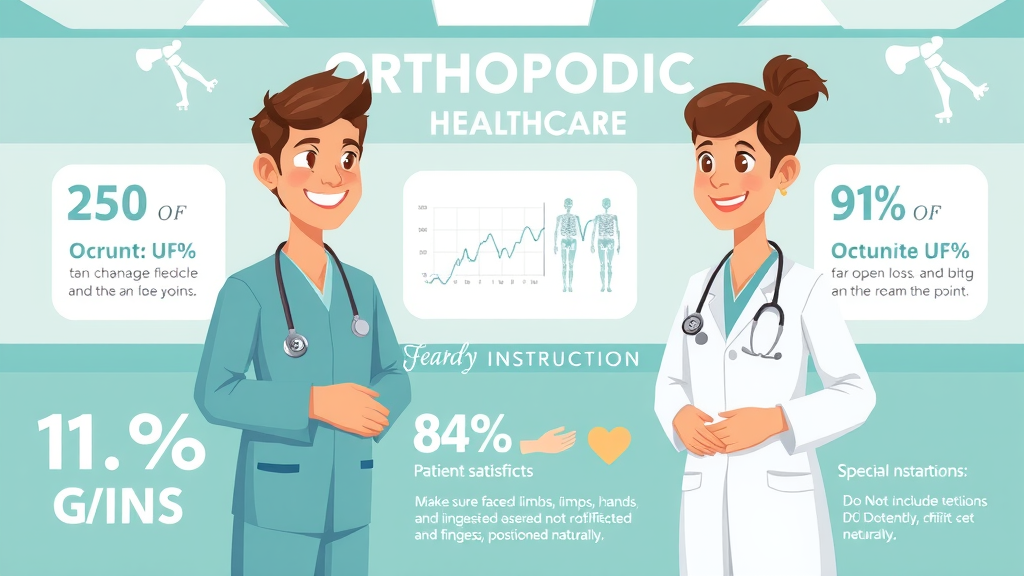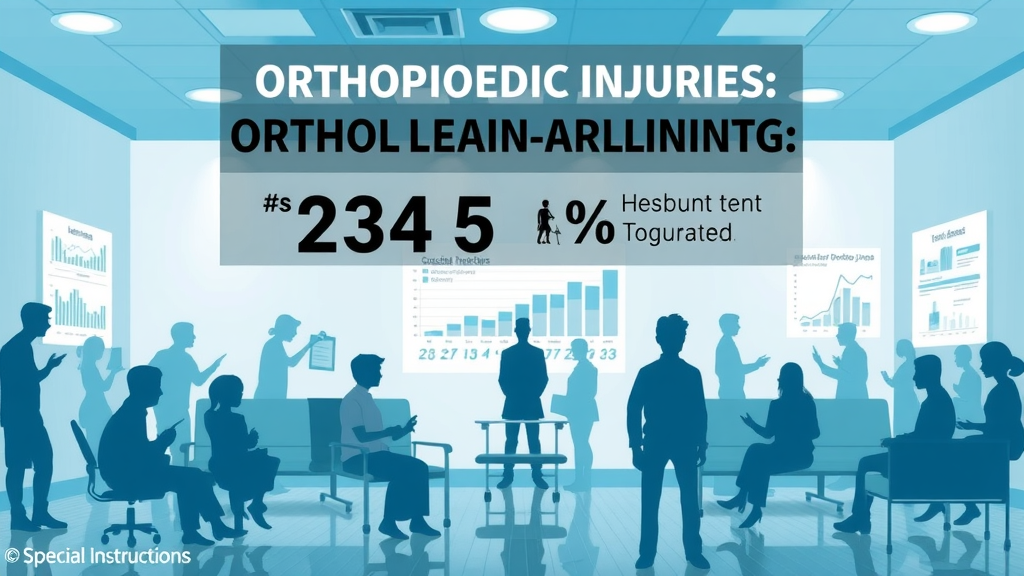Did you know that compassionate orthopedic care significantly improves patient recovery rates and satisfaction? In Wake County, patients are increasingly valuing treatment that combines clinical expertise with empathy and personalization. This approach isn’t just about fixing bones and joints; it’s about understanding each individual’s unique lifestyle and health needs to foster a faster, fuller recovery. Join us as we explore how this personalized, compassionate care is transforming orthopedic treatment and patient outcomes.
Startling Facts About Orthopedic Care and Its Impact on Patient Outcomes
Orthopedic conditions affect millions every year, and the way care is delivered can be the difference between prolonged discomfort and a swift return to normal life. Studies indicate that patients receiving compassionate orthopedic care report over 30% higher satisfaction scores and notably faster recoveries compared to standard treatment models. By prioritizing empathy and individualized attention, orthopedic specialists in Wake County are reducing unnecessary surgeries and improving quality of life.

What Is Compassionate Orthopedic Care? An Overview
Compassionate orthopedic care centers on treating the whole person rather than merely addressing a disease or injury. According to Dr. Timothy Larson of Denton Hand & Orthopedics , "Compassionate orthopedic care means treating each patient as an individual, not just a diagnosis. Our goal is to provide care that respects their lifestyle and promotes the best possible recovery." This patient-first mindset ensures treatments are tailored, empathetic, and aligned with patients' goals and day-to-day life.
Key Features of Compassionate Orthopedic Care in Wake County
- Individualized treatment plans based on thorough evaluation ensuring each patient’s unique needs and lifestyle factors are considered.
- Use of in-office X-ray and ultrasound for quick diagnosis enabling immediate imaging that speeds up evaluation processes.
- Conservative treatment whenever possible , aiming to avoid unnecessary surgery and reduce patient risk.
- In-office hand therapy to support efficient recovery and functional restoration.
- Expert application of casts, braces, and orthopedic devices providing effective stabilization and comfort.
- Minimally-invasive surgical procedures performed at nearby centers to minimize pain and recovery time when surgery is essential.
- Contracted with multiple insurance providers helping to lower out-of-pocket expenses for patients.
- Rapid access for acute care needs , ensuring urgent cases are handled promptly to prevent complications.

General Orthopedic Care vs. Orthopedic Surgery: Understanding Your Options
Many patients face the difficult decision of conservative therapy versus surgical intervention. In Wake County, the emphasis is consistently on compassionate orthopedic care by first attempting non-surgical approaches. Dr. Timothy Larson stresses, “We always attempt conservative treatment first. Surgery is considered only when necessary, ensuring patients receive the least invasive and most effective care possible.” This strategy maximizes patient safety and comfort, reserving surgery for cases where it truly promotes improved outcomes.
Benefits of Minimally-Invasive Orthopedic Surgery
When surgery is indispensable, minimally-invasive techniques offer several advantages. These include smaller incisions, less tissue damage, reduced postoperative pain, quicker healing times, and often shorter hospital stays. The skilled orthopedic surgeons in Wake County employ these advanced procedures to ensure patients gain the maximum benefit with minimal disruption to their lives.

Orthopedic Services Offered in Wake County, North Carolina
- In-office imaging: X-ray and ultrasound for immediate assessment and diagnosis.
- Hand therapy and physical rehabilitation tailored to restore function and strength promptly.
- Application of orthopedic devices: including casts and braces designed for optimal support and comfort.
- Minor procedures covered by insurance , allowing many treatments without extensive hospital stays or costs.
- Acute care for urgent orthopedic conditions with rapid appointment availability.
- Joint replacement consultations and surgeries , combining compassionate care and surgical expertise.
- Sports medicine and injury management focused on personalized rehabilitation and prevention.
How Compassionate Orthopedic Care Enhances Sports Medicine and Joint Replacement Outcomes
Athletes and active individuals treated with compassionate orthopedic care benefit from customized rehabilitation plans that address their specific sports needs and goals. Hand therapy, physical therapy, and minimally-invasive surgery facilitate quicker returns to peak performance. Similarly, joint replacement patients experience individualized care plans that emphasize pain management, mobility restoration, and long-term joint health. This holistic approach reduces downtime and fosters patient confidence throughout recovery.

Common Questions About Orthopedic Care Answered
What is the difference between orthopedic and orthopaedic?
The terms orthopedic and orthopaedic essentially mean the same thing—the branch of medicine that deals with the correction or prevention of deformities, disorders, or injuries of the bones, joints, and muscles. The difference is primarily regional spelling preference, with “orthopaedic” traditionally used in British English and “orthopedic” more common in American English.

What is the most common orthopedic operation?
The most commonly performed orthopedic surgery is knee arthroscopy, a minimally-invasive procedure to repair or remove damaged tissues within the knee joint. Other frequent operations include joint replacements (hip and knee), carpal tunnel release, and fracture repairs.
What type of medical issues does an orthopedic specialist treat?
Orthopedic specialists manage a broad spectrum of conditions ranging from acute injuries such as fractures and sprains to chronic diseases including arthritis, tendonitis, and congenital deformities. They also address sports injuries, repetitive strain injuries, and degenerative joint diseases.
What's the difference between rheumatology and orthopaedics?
Rheumatology is a medical specialty focusing on autoimmune and inflammatory diseases affecting joints, muscles, and bones, such as rheumatoid arthritis and lupus. Orthopedics is surgical and non-surgical care for musculoskeletal system injuries and deformities. Often, these specialties collaborate for comprehensive patient care.
What You'll Learn: Key Takeaways on Compassionate Orthopedic Care
- The importance of individualized, compassionate care in orthopedic treatment
- How conservative treatments can prevent unnecessary surgeries
- The role of in-office imaging and therapy in accelerating recovery
- Benefits of minimally-invasive surgical options
- How insurance partnerships reduce patient costs and improve access
- Why quick access to acute care is critical for optimal outcomes
| Service | Description | Benefits |
|---|---|---|
| In-office Imaging | X-ray and ultrasound for quick diagnosis | Faster treatment decisions, reduced need for external referrals |
| Hand Therapy | Specialized rehabilitation services | Improved recovery and function |
| Orthopedic Devices | Casts, braces, and supports | Stabilization and pain relief |
| Minimally-Invasive Surgery | Surgical procedures with small incisions | Less pain, quicker recovery |
| Insurance Coverage | Contracts with multiple providers | Lower out-of-pocket costs |
| Acute Care Access | Rapid appointments for urgent needs | Timely intervention to prevent complications |
Conclusion: Embracing Compassionate Orthopedic Care for Better Health
As Dr. Timothy Larson of Denton Hand & Orthopedics emphasizes, “Our commitment to compassionate orthopedic care means we focus on healing the whole person, not just the injury. This philosophy guides every decision we make for our patients.” When orthopedic treatment is delivered with empathy, expertise, and personalization, patients in Wake County experience superior recovery, reduced pain, and improved quality of life. Choosing compassionate orthopedic care means partnering with professionals who prioritize your unique journey toward healing.
Ready to Feel Better? Schedule Your Consultation Today.
Take the first step toward personalized, compassionate orthopedic treatment. Contact our Wake County specialists today to schedule your consultation and discover how tailored orthopedic care can transform your healing process.
In Wake County, North Carolina, compassionate orthopedic care is transforming patient experiences by emphasizing personalized treatment plans and empathetic communication. This approach not only addresses physical ailments but also considers individual lifestyles and health needs, leading to improved recovery rates and patient satisfaction.
For instance, the Schwartz Center for Compassionate Healthcare highlights the significance of human connections in medical treatment, advocating for compassionate care that fosters meaningful collaboration between patients and healthcare professionals. ( en.wikipedia.org )
Similarly, Broward Health offers specialized, compassionate orthopedic services aimed at helping patients reclaim their lives without pain, emphasizing personalized treatment options for a wide range of conditions. ( browardhealth.org )
These resources underscore the importance of integrating empathy and individualized attention into orthopedic care, ensuring that treatments are not only clinically effective but also aligned with each patient’s unique journey toward healing.
 Add Row
Add Row  Add
Add 




Write A Comment